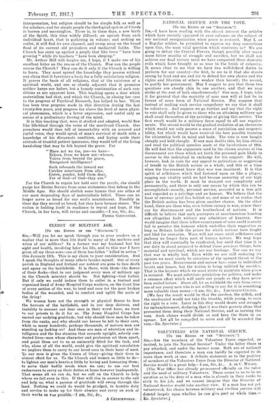CLERGY OF MILITARY AGE.
(To TER EDITOR Or THE " SPECTATOR.") SIa, Will you let me speak through you to your readers on a matter that is more than life itself to many of the mothers and wives of our soldiers? In a former war my husband lost his sight and health, involving later his life, and to this war I have given all my three sons—one of them has fallen " killed in action " this January 11th. This is my claim to your consideration. And I speak the thoughts of many others besides myself. Out of every parish in England and Ireland our noblest are gone to face death and agony on the battlefields. It is there, with them—the flower of their flocks—that in our judgment every man of military age in the Church ministry should be. Not fighting—God forbid. But if only we could induce them to enlist in a trained and organized band of Army Hospital Corps workers, on the front line of every section of the war, to tend and care for the poor broken bodies of the wounded, and to comfort and uplift the souls of the dying!
We women have not the strength or physical fitness to face the horrors of the battlefield, and in our deep distress, and inability to succour our dear ones in their worst hour, we turn to our priests to do it for us. The Army Hospital Corps has earned our undying gratitude; but why should these men be taken from the ranks, and why should our heroes be left to their care, while so many hundreds, perhaps thousands, of mature men are standing up looking on? And these are men of education and in- telligence and the fine stamina that rewards upright, soberly con- ducted lives—men whose character and profession set them apart, and point them out to us as eminently fitted for the task, and who, alone of all the world, could give the spiritual consolation we implore them to carry to our loved ones in their hour of need. To our men is given the Crown of Glory—giving their lives in utmost effort for us. To the Church and women so little to do— to lighten our men's hearts a little by loving and honouring them; to serve their bodily needs when we can; to use our best endeavours to carry on their duties at home however inadequately. That seems all we can do, but we call on the Church to help where we fail even in this. If they will rise in answer to the call and help us, what a passion of gratitude will sweep through the land. Nothing we could do would be grudged, in humble duty and service to make up for their absence and carry on such of their works as was possible.—I am, Sir, &c., A C1117RCHWOILLY.


































 Previous page
Previous page